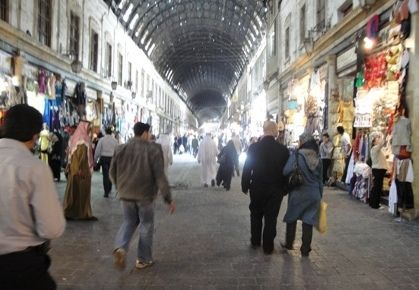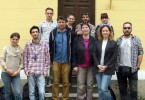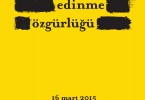Cristina Rotaru
Visiting the Middle East requires a whole lot of determination and an open mind towards all sorts of unheard of things, from food to getting alternative transportation, but most of all it means leaving your pre-requisites back home and allowing yourself to be welcomed by the friendliest people you’ll ever meet.
There are all sorts of definitions as to what the Middle East actually is, and even geographically speaking it is still not quite clear what belongs where and why. A quick glimpse into any travel guide will tell you that the Middle Eastern area includes everything from Turkey down to Egypt and further to the East, towards Iran and Iraq. Why is it then that coming back from Damascus to Istanbul gives you the feeling that you’re walking the catwalk of the most exclusive Western fashion city? There must surely be some other kind of classification other than the geographical one, and seeing one place in the Middle East doesn’t mean that you have seen them all.
From a sociological point of view, observing people’s perception of themselves and, more importantly, of others, is quite an exhausting task. As a European woman coming from Istanbul, you’re bound to get all sorts of reactions, none of which are universally valid. First of all, being a woman in the Middle East automatically diminishes your authority in front of a crowd of male officials. Secondly, you have your obvious European appearance and accent, which distinguish your status from that of other women that might be present. On top of that add the simple fact that you are living in Istanbul and the result will obviously be an unpredictable situation.
Upon entering Syria from Turkish lands, crossing the border of Reyhanli, you are better off expecting the unexpected. Being told that acquiring a Syrian visa straight at the border should be of no distress; one can merely believe in the authority of the Consulate employees and take their words for granted. But it is not always so. It can also be that the border officials who simply decide not to grant you the benefit of entering their beloved country and it seems as if there is nothing you can say to change their mind. The recurring sentence to your mind, “This would have never happened in Turkey” isn’t really of any assistance, and none of the police officers seem to mind the idea of leaving two girls stranded on the Syrian border alone. Speaking their language might come as an advantage in these kinds of situations, but if you are so lucky as to have an Arabic friend you’ve just met on the bus to fight for you, you might not really need it. 30 USD and many dazing hours later, you will find yourself driving in unknown lands, no questions asked. “Welcome to our country Syria”.
The variety of cultures and peoples living in the Middle East is vast, not to mention the fact that it is the birthplace and spiritual center of Christianity, Islam and Judaism. It is often being referred to as ”the Cradle of Civilizations” and this for a very good reason, if you regard the place’s history. In ancient times, it was Mesopotamia and Egypt that set the standards for others to follow for many centuries, and after that came the mighty Persian Empire. The Turkic Seljuks and Ottomans under Sultan Selim I (1512 – 1520) would later dominate the same region, leaving their mark deeply encrypted in Middle Eastern traditions and ideologies. The complexity of the people living here then becomes quite apparent, as they have not one but numerous, often conflicting, senses of identity. Having been controlled by the Ottomans for so many centuries, one can only assume that they would develop some sort of a passive resistance attitude, as conquered people often do against the ones who once controlled them. But I have found that coming from Turkey is often a good thing in the Middle East. Most of the people have either already been or wish that they will one day be able to go there.
Ghadi Malluohi is a 25 year old student in Damascus of Lebanese descent, but his family moved to Syria during the first Lebanese War in 1982. “People here are incredibly nice to tourists, they give you everything for free and smile their charming smiles at you”, he tells me, “but if I were in your place trying to buy something at a street corner, they wouldn’t even bother giving me a second look, not to mention a smile or a witty comment.” Ghadi talks about his country with something between admiration and hate, vehemently proclaiming living in a European city as his main goal in life. His family is somewhat wealthy and, having already traveled quite a bit through Europe and the Americas in his younger days, he got the taste of it and won’t let go.
Strikingly enough, not all people share his vision. In fact, the population of the desert in both Syria and Jordan differ quite a bit from the urbanized Arabs in Damascus or Amman.
The desert-dwelling Bedouins (from Arabic badawī) have left their mark deeply rooted in these places. This once-upon-a-time nomadic Arab ethnic group used to be politically relevant, including such names as Zayed bin Sultan Al Nahyan, late president of the United Arab Emirates. Since the 19’/50s and 19’/60s however, many of them preferred settling into cities of the Middle East, leaving their traditional lives behind. But a short trip to the desert will tell it is not entirely so.
Wadi Rum and Petra have become major tourist attractions for the Hashemite Kingdom of Jordan, and it is here where the Bedouins still live their unaltered lives. Their income comes mostly from tourism-based activities, by producing and selling artifacts, drinks and foods, or even providing camel or donkey rides. For such an experience, travelers can pay up to 15 Jordan Dinars (20 US Dollars) to spend a night under the stars in the Wadi Rum desert, dinner and breakfast included. But there is more to these people than meets the eye, even though at first glimpse it might seem like they are literally trying to hassle you for your money. They are proud to live a life of freedom and courage, and they still obey the Bedouin Honor Code. This means that they have a simple set of ethics that they follow – not by force, but by free will. Along with hospitality, honor is a key element for their existence, and it is also the higher authority by which justice is dispensed. Their dark eyes seem to hide many secrets, and they’re usually not ashamed to admit it. ”Many tourists tell me I look like Johnny Depp, but I always tell them the same thing: Johnny Depp looks like me!”, one of them confides.. They have many things to say and if you happen to be someone who listens or just someone they like, they will let you in on some of their secret games or cooking recipes. They are sharp and raw and extremely confident, challenging your knowledge at every given moment, so much so that you might even start to question your priorities and to ask yourself if an academic education is enough to get you through life. A consumer’s life in the city seems vain indeed, especially when you see the pureness in the eyes of a 14 year old dust-covered boy who regards the desert as his playground.
But living a Bedouin life isn’t for any man, as they have often made clear. “Was it painful, getting this tattoo?”, someone asked. “For you, my friend, it’s painful.”
Whether it is the desert or some urban place in the Middle East, it all comes down to the people you meet. And even if Europe might have sights that are equally beautiful to visit, the Middle East conquers you by the fascination of its inhabitants, by making you wish you’d live a life you know you never can.







